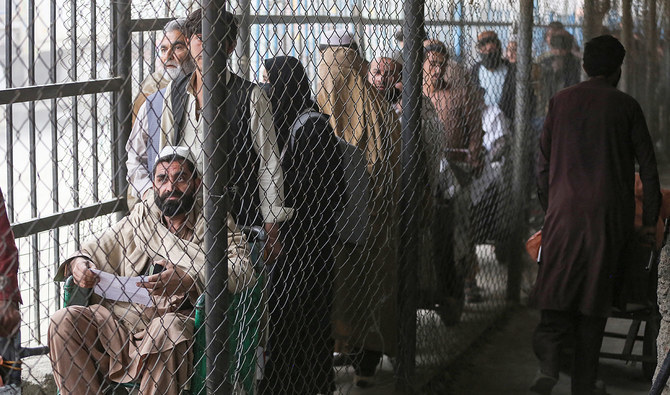ISLAMABAD: With over 200 Afghan journalists and their families facing deportation from Pakistan, a federation of Afghan journalists on Tuesday urged the Pakistani government to reconsider its decision to expel them from the country.
According to data by the Pakistan-Afghan International Forum of Journalists, at least 650 media workers fled to Pakistan fearing persecution at the hands of the Taliban after the group took over Kabul in August 2021. About 400 journalists have made it to different countries, including the US, Germany and France, but the rest have been stuck as their travel documents have expired.
Pakistan's caretaker interior minister announced last Tuesday the government would deport illegal immigrants in the country from Nov. 1. While Pakistan says the operation would not be restricted to people of any particular nationality, the move is likely to impact Afghan nationals in Pakistan the most.
“The majority of Afghan journalists entered Pakistan legally but Pakistani authorities are not extending our visas now,” Hashmat Vejdani, spokesperson of the Federation of Afghan Journalists in Exile, told Arab News on Tuesday.
“Those who entered Pakistan illegally to escape Taliban persecution have also applied for visas but the government was not entertaining their applications.”
At least 600,000 Afghans fled to neighboring Pakistan after the withdrawal of foreign forces from Afghanistan in August 2021, according to the United Nations refugee agency.
Even before then, Pakistan hosted some 1.5 million registered refugees, one of the largest such populations in the world, according to the United Nations refugee agency. Over a million others are estimated to live in Pakistan unregistered.
Afghan journalists in Pakistan are anxiously waiting for visas from countries that previously employed them and have often complained that Pakistani police detain or threaten to arrest them for bribes, a charge police officials deny.
For over 200 Afghan journalists in Pakistan, the clock is ticking as their travel documents are expiring.
"Cases of the majority of Afghan journalists staying in Pakistan are under process for resettlement in European countries, therefore Pakistani government should reconsider its decision,” Vejdani said.
He voiced fears that Afghan journalists deported to Afghanistan would either be jailed or killed by the Taliban.
“The media in Afghanistan is in total control of the Taliban," he said. "We have worked for Western news organizations during the war so the Taliban consider us their staunch enemies."
Vejdani said Afghan journalists are ready to cooperate with the Pakistani government and called upon authorities to extend their visas till their resettlement applications are not finalized.
He said Afghan journalists and their families in Pakistan were registered with the Society for Human Rights and Prisoners’ Aid (SHARP), a Pakistani NGO that is an implementing partner of the UNHCR.
“Our deportation would clearly mean throwing us to the Taliban for murder," Vejdani said. "Pakistan should heed our requests for a safe and legal stay here."
Pakistan’s interior ministry did not respond to calls and messages seeking their version for this story.
Separately, the International Federation of Journalists (IFJ) on Tuesday urged Pakistan's government to reconsider its decision and called on media stakeholders, civil society organizations, and international governments to increase their support for Afghan journalists in exile.
“At least 200 Afghan journalists are currently refugees in Pakistan, forced to flee the Taliban’s crackdown on press freedom, including draconian restrictions on women journalists, shuttering of media houses, and rampant censorship,” the IFJ said in a statement.
In August, the IFJ and Pakistan Federal Union of Journalists (PFUJ) established two solidarity centers in Islamabad to aid Afghan journalists that provided emergency housing, legal and psychological support. One of the two centers is exclusively for women journalists.
“We have the data of 256 Afghan journalists in Pakistan, and we have been in touch with the government to chalk out a way for their stay in the country,” PFUJ President Afzal Butt told Arab News.
“We know the lives of these journalists would be in danger if deported to Afghanistan, therefore we have been trying our best for their legal stay in Pakistan until their resettlement to third countries,” Butt added.












